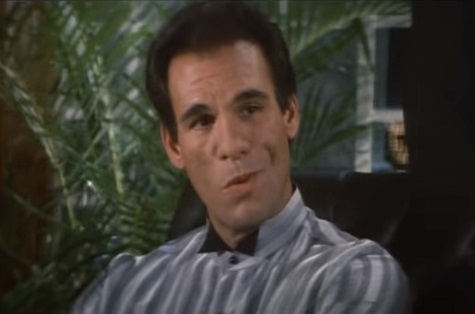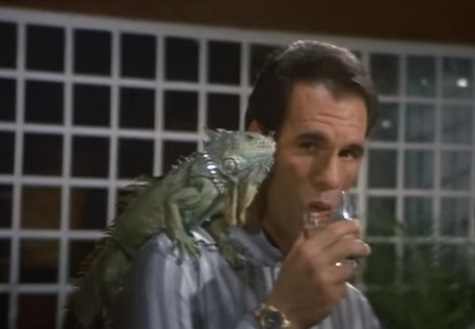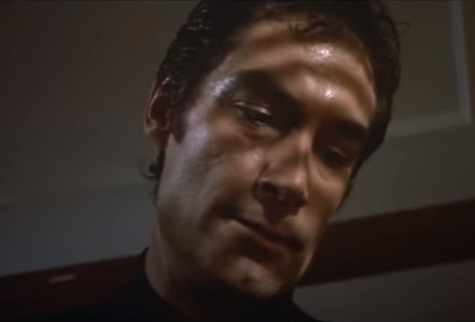Over the past 60 years of movies, James Bond has been played by six men and directed by a dozen. He’s travelled all over the world and into space, had one-off missions and ongoing sagas, blithely banged scores of women and cried over a lost love. There’s no definitive James Bond but he carries some consistent qualities through his adventures, right? Toughness, ingenuity, romance, elan. You watch a Bond movie because James Bond is cool.
In License To Kill, James Bond is pissed. He is stripped of [see title], which the state grants him so he can kill on its behalf, and becomes a loose cannon who gets results, you stupid M. That those results are often counterproductive and based in vengeance doesn’t matter in a broad sense. Bond is out there stopping unlawful behavior in explosive fashion in exotic locales and that is the immutable core of any Bond movie. But it feels off here.
Writer Steven de Souza holds that in genre, the villain is the protagonist: he’s the person that makes bad things happen, which the hero responds to. De Souza’s example is his own script for Die Hard, where John McClane gets caught up in a heist and is forced to own dudes he would not have otherwise. James Bond does not quite fit this scheme; his job is to respond to bad things and thus he actively seeks them out. But the bad things are usually outlandish and unique plots that only he is equipped to stop, Fort Knox heists and space station nerve gas drops and whatnot. Here, Timothy Dalton’s Bond is going after Robert Davi’s Fran Sanchez, a nasty character to be sure, but one who is mainly concerned with his ongoing work of dealing drugs and laundering the proceeds through Wayne Newton. He’s not exactly supervillain material, and not interested in doing anything but expanding his operations into a new Asian market. He is a businessman, not a megalomaniac, just trying to sell some dang drugs. Is that so wrong?

Well, yes, it is. But it’s worth noting how Bond gets involved with Sanchez in the first place — he and CIA chum Felix Leiter jump at the chance to arrest him even though they are on the way to Leiter’s wedding. A grand time is had by the boys, who really could’ve sat this one out considering the entire DEA is involved, and they nab Sanchez and parachute into the wedding. Sanchez responds by escaping, raping and murdering Leiter’s bride, and tossing Leiter into an aquarium where sharks bite his legs off. This is all extremely bad! But Bond and Leiter decided to turn their personal time over to catching Sanchez; it’s not surprising he gets personal in return. So Bond responds in kind — he throws over his job and the whole Queen and Country bit (MI6 wants him to go to Turkey for a new mission, Bond says no dice) to infiltrate Sanchez’ operation in order to destroy it from within.
This rejection of his role as an official agent is one thing, but Bond’s sloppy attempt to assassinate Sanchez winds up compromising an ongoing Hong Kong investigation of the drug lord and promptly getting all of these hardworking professionals killed. This would seem bad, but it helps prove Bond’s bona fides to Sanchez, so it’s a net plus for 007, who further demonstrates his value by finding and eliminating a traitor in Sanchez’ midst. This “traitor” is a guy Bond himself framed, but you can’t make an omelet without violently exploding a few horribly screaming eggs in a decompression chamber. All of these destabilizing events make Sanchez rely more and more on Bond (as opposed to his bodyguard, a suspicious and smoldering Benicio del Toro) and bring him into the inner circle as Sanchez prepares a massive drug deal.

Wait a minute — Sanchez is the reactor, the guy responding to unfortunate events. So does that make Bond not a hero, but the protagonist? The villain? Complicating things is Davi’s increasingly exasperated but almost naïve performance as Sanchez: he is an evil man happy to cause pain, but he is not dishonest and holds loyalty as his highest value. He anticipates another honest crook, Jon Polito’s crime boss Johnny Kapsar in 1990’s Miller’s Crossing, who is always abiding by ethics and straight shooting (literally, in the brain) and trying to run his rackets with a minimum of fuss and illogic. Kaspar also comes to rely on a would-be friend who is trying to undermine him, his very willingness to trust people exploited by a ruthless liar. Kaspar and Sanchez are honorable men in their twisted way, and who doesn’t feel a twinge when a man of honor is undone by nefarious means? But on the other hand, who doesn’t like to root for the bad guy?
License To Kill makes James Bond the villain, not in a wienerish vaguely-questioning-subservience-to-centuries-of-racist-imperialism way but as the center, the driving force of its story. And it rules! Lots of people die horribly, lots of real trucks get really blown up, Bond does not give a shit about anything but revenge. There’s a meanness to the movie and to Dalton’s performance that is a lot of nasty fun; anyone who appreciates action and explosions and goons feeding victims to sharks only to be dispatched via their own ironic evisceration will find much to enjoy. But if someone asked me to recommend a James Bond movie I don’t think I’d pull this one out. The qualities that I love about it make it an outlier, something that doesn’t fit with the overall brand. You wouldn’t give someone who ordered a vodka martini a shot of tequila and Tabasco (aka the Prairie Fire) instead. Sure, both will get you drunk, but one is cool and classy. The other one is a slug to the gut.
What other movies are good on their own terms but bad examples of their larger group?


